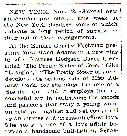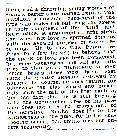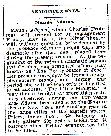
The Pretty Sister of Jose
The play, produced by Charles Frohhman and written by Francis Hodgson Burnett, opened in New York on November 10, 1903 and ran for 58 performances. Miss Adam's (who played Pepita) own appraisal of her performance was quite negative. She wrote:
"It was wonderful to be home again. But the play for the winter was an unfortunate choice. It was a good play, but I was not good in it; to be quite frank, I was impossible. What with illness and disappointment, I felt at the end of everything, and no little ant seemed to be coming up the log."
A critic's position, though, was quite different:
"It began in the wings, and one was prepared to have it stop with Miss Adam's entrance. But it did not stop, and as cadence succeeded cadence, it was evident her singing voice is as deep, rich and harmonious with velvet resonance as the voice with which she speaks."
=====Charles Frohman:" Manager and Man by Issac F. Marcosson and Daniel Frohman, with an Appreciation by James M. Barrie. 1916=====
For her next starring vehicle, Charles presented Maude Adams in "The pretty Sister of Jose," a play which Mrs. Frances Hodgson Burnett made of her well-known story. She was supported by Harry Ainley, at that time England's great matinee idol. Here Miss Adams encountered for the first time something that resembled failure, because she was not adapted to the fiery, passionate character of the impetuous Spanish girl. The play, however, made its usual tour after the local season, and with much financial success.
=====American Theatre: A Chronicle of Comedy and Drama, 1869-1914 by Gerald Bordman; Oxford University Press, 1994=====
Having offered playgoers John Drew and Ethel Barrymore, among others, Charles Frohman now brought forth the actress who was judged his leading attraction at the time, Maude Adams. "Were the young actress a Bernhardt, a Duse and Calv rolled into one," Theatre remarked, "the ovation she received . . . could not have been noisier or more genuinely spontaneous." The magazine went on to opine that her "fair face is her fortune, and dainty gestures, coy glances, mischievous playfulness . . . a source of unmixed delight." Her vehicle was another matter. The play was Frances Hodgson Burnett's The Pretty Sister of Jos ( 11-10-03, Empire), and its leading role, that of a girl wary of men and matrimony, was not unlike Ethel Barrymore's a few weeks earlier. Pepita is a country girl who comes to Madrid and almost against her will kindles the first sparks of real love in the dashing, womanizing bullfighter, Sebastiano ( Henry Ainley). She rejects him so persistently that he finally stalks off, vowing enough is enough. Only then does Pepita's heart melt, and she attempts to rekindle his ardor by dancing for him in a caf garden. The dance unnerves Sebastiano. He becomes careless when he enters the bullring and is gravely wounded. Pepita devotedly nurses him back to health. The part of Pepita's simple-minded brother was so insignificant that many reviewers took no notice of the actor who played it, young Edgar Selwyn.
Reviews
“From the moment of her appearance in the garden of her brother's home, Miss Adams darts through the moods in which she is most bewitching. She is simple, innocent, impulsive, imperious, head-strong and vindictive by turns. But she is always sympathetic and charming. She romps all over the stage. She tosses her head with girlish hauteur, shrugs her slender shoulders with dainty and charming cynicism, abandons her frail self to the whirl of the fantiango and gives way to the torrents of nervous emotion which she summons from strange and mysterious depths of her soul. In the end the woman in her replaces the headstrong girl. Her imperiousness disappears and she melts to tenderest affection and devotion. yet in all her moods she is ever the elf.” The World, Nov. 10, 1903
“Miss Adams impersonation of Pepita was radiant in spirit and filled with her own gracious personality. She was, however, not in the lest Spanish. Her movements, her manner of speech and even her dances were Anglo-Saxon. In the light comedy scenes, where she taunts Sebastiano and holds him at bay with girlish coquetry, she was at her best, and she was admirable, too in showing the dissolution and wistful sadness that fell upon her when her lover departed. But where strong Latin emotion was needed Miss Adams was a bit disappointing. She made the character interesting, however, and she surprised and delighted her audience by singing a song in charming musicianly fashion.”
Dramatic Mirror, Nov. 21, 1903
“Miss Adams answered ten curtain calls. Then she made a speech. Her fingers twitching nervously, she stepped forward with hesitation and said, scarcely loud enough for those in the first rows to hear: 'I could not tell you how I feel. You are all so very kind to me. Thank you.” New York Evening Journal, Nov. 11, 1903
 Lincoln Evening News, May 2, 1904 |
One of the advertisements for the play. Notice that her name is spelled "Maud" instead of "Maude."
 Sandusky Evening Star, Nov. 6, 1903 |
 Lincoln Evening News, Nov. 28, 1903 |
 same source |
 Lincoln Evening News, May 12, 1904 |
 Oakland Tribune, June 4, 1904 |
Notice that the first article (leftmost one) refers to an illness that she had. The next two examples talk about the play itself. The final article (on the right) is typical of some articles I've seen that talk about how much the people in the city are looking forward to seeing her perform.
The story itself and some other materials can be found here.
|